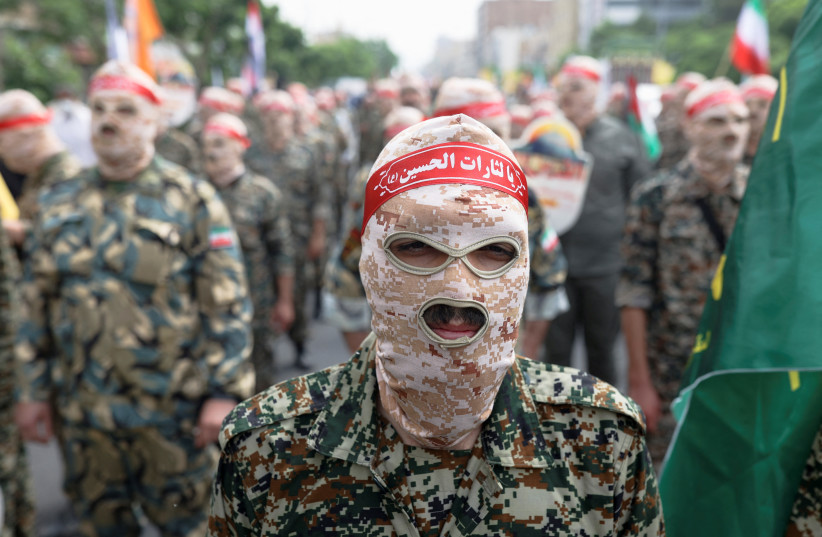What will change regarding Iran over the next half a year or so while Israel is in elections and coalition-forming mode?
Will the ayatollahs try to take advantage of the temporary nature of Israel’s current governing coalition and its uncertainty about the future?
From one perspective, probably yes.
The Islamic Republic is at the height of an extended war of wills with Jerusalem, Washington and the West over both its nuclear program and its ambitions to be the hegemon of the Middle East.
Why not use every advantage that comes up, such as an Israeli election potentially weakening how big Israel can go?

In the worst-case scenario, Tehran could even try to rush out to a nuclear weapon, or less scary but still scary – to cross the nuclear uranium 90% weaponization threshold.
Then it could dare an Israeli transitional government to order a major aerial attack on its nuclear facilities that could flop, lead to dead pilots and even a larger counterattack of rockets from Hezbollah, Hamas and Iran itself.
Wouldn’t a transitional prime minister-to-be Yair Lapid hesitate a little bit more about ordering such a fateful operation when he is a caretaker and about to face the voters?
On the other hand, this scenario pretty much misses the reality of what has been happening between Israel and Iran since February, and even more since April, when US President Joe Biden told outgoing Prime Minister Naftali Bennett that he would not remove the Islamic Revolutionary Guard Corps from America’s Foreign Terrorist Organizations list.
Israeli attacks against Iran in overdrive
Since then, the covert assassinations, sabotage and cyber warfare from Jerusalem against Iran have been in overdrive.
Multiple key Iranian facilities have been attacked, several Iranian nuclear and drone development scientists have been assassinated along with IRGC officials in charge of overseas terror operations.
Iranians have faced multiple embarrassing hacks interfering with the provision of various electronic services or have seen large potential data thefts, allegedly courtesy of Israel.
Mossad Director David Barnea is due to be in office at least until June 2026. Shin Bet (Israel Security Agency) Director Ronen Bar is due to be in office at least until October 2026. The earliest change in the security team could be IDF Chief Lt.-Gen. Aviv Kohavi, who might step down in January.
BY JANUARY, however, elections will be history and there might even be a new government.
Also, it is still theoretically possible that Kohavi will have a new permanent replacement by then.
Either way, the Mossad, Shin Bet and IDF will remain islands of stability amidst the continued political turmoil.
Bennett invested heavily in bringing all of the agencies, especially the Israel Air Force, up to speed to undertake any and all aggressive actions necessary to thwart Iranian nuclear progress and deter terrorism against Israel or Jews overseas.
At the same time, throughout this period, the Islamic Republic has tried to kill Jews overseas, to attack Israel with drones to smuggle weapons to its proxies on Israel’s borders to be ready to fire both “dumb” and “smart” precision rockets at Israel if the need arises.
It has also repeatedly penetrated aspects of Israel’s digital sphere to create disorder and gain data advantages for future conflicts.
All of this means that covert wars and cyberwars will likely continue unimpeded by the unstable political moment.
Finally, Israeli intelligence officials view Iran as six months to two years away from a nuclear weapon. So it is not as if it can actually suddenly complete a nuclear breakout between now and Election Day in October.
Moving to 90% weaponized uranium could happen, but that would still leave a six month to two year gap to accomplish other nuclear skills. And that could have happened at any time in the last year or so, in which case it would have been unclear that Israel, even with a permanent government, would have undertaken a major preemptive strike based on that change.
It is unlikely that the ayatollahs will risk Israel’s ire by something overly dramatic. Even when Iran shut off “all” of the IAEA’s cameras, it was actually 27 out of around 70 – meaning two-thirds of the cameras remained. That was Tehran communicating that it was mad, but not ready to walk away completely from nuclear negotiations.
So there is no reason to expect Iran will get quieter than the current state of constant low-grade conflict and it may even try to provoke Israel some, but not likely in a game-changing fashion.
The counter question is whether Lapid or Bennett will try to pull off a large and more public covert attack on Iran to gain some new support at the polls.
One would hope the answer would be no and that they will keep everything professional, but Bennett has used the Mossad and IDF more than once in the last year to get some positive attention – and he may again.
